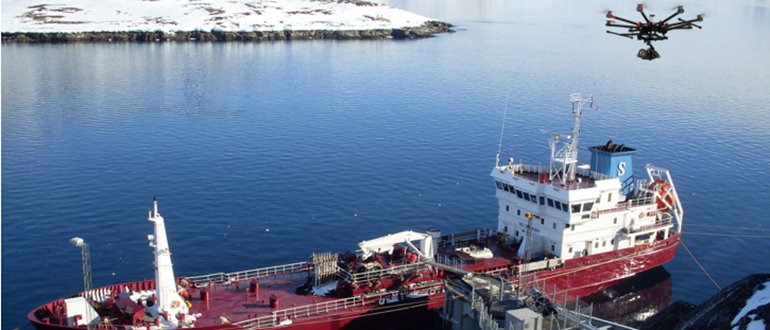The Arctic can in future be a faster, more direct route to ship between ports in Europe, Eastern North America, and Far East Asia. However, due to climate change, many glaciers are rapidly melting, breaking off chunks of the Greenland ice sheet and creating icebergs. These icebergs are a significant danger to the shipping vessels.
Drones used to detect icebergs
ArtDrone project aims to help the Artic Shipping Companies by using drones or UAS (Unmanned Aerial Systems) for detection and tracking of potentially dangerous icebergs. To do this, researchers at SDU UAS Center will develop a long-range drone completed with ice protection systems and infrared cameras mounted in a stabilized frame.
The overreaching goal of the ArtDrone project is to develop a real-time aerial data acquisition system for Danish Arctic shipping companies.
Drone operations in the Arctic
Using drones to detect icebergs has advantages compared to other aerial systems. Drones offers high endurance, reduced cost, increased flexibility and availability, rapid deployment, higher accuracy or resolution, and reduced risk for humans and negative impact on the environment.
Researchers from SDU UAS Center will develop a UAS with icing protection system. We consider two type of UAS: a fixed wing drone with Vertical Take-Off and Landing (VTOL) technology, and a rotorcraft drone. Each drone has its own advantages. A fixed wing drone has efficient aerodynamics, which gives longer flight durations at higher speeds. This will enable larger survey areas per given flight. While the rotorcraft drone has the ability to take-off and land vertically. This allows the user to operate within a smaller vicinity with no substantial landing or take-off area required.
The drone will be equipped with a thermal camera, redundant sensor system, such as GPS, IMU, Lidar, and a radar.
Cheaper and safer shipping
The expected outcome of this project is a list of recommendations and UAS specifications for Danish Arctic shipping companies, which will use UAS for aerial data acquisition.
The shipping companies can use acquired information to find safer and shorter routes, which will eventually reduce the operational cost and environmental impact significantly.
Read more about the project Drones to make short cut through the Arctic safe
Funding
The Danish Maritime Fond (Den Danske Maritime Fond) by 175,000 DKK
Project period
2018-2020
Contact information
Ulrik Pagh Schultz Lundquist, SDU UAS Center, ups@mmmi.sdu.dk
